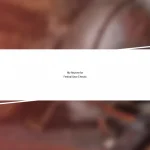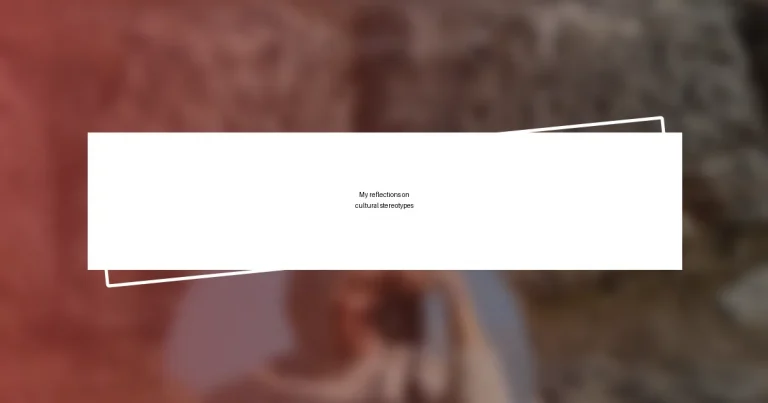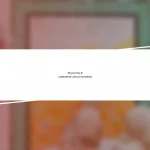Key takeaways:
- Cultural stereotypes oversimplify identities and can lead to misunderstandings, highlighting the need for personal engagement to appreciate individual experiences.
- Stereotypes create limitations and distrust, hindering opportunities and genuine connections between individuals and communities.
- Challenging stereotypes through diverse friendships, storytelling, and education promotes cultural awareness and empathy, fostering deeper understanding and inclusivity.
- Personal experiences and reflections reveal the impact of stereotypes, pushing individuals to advocate for richer narratives and complexities beyond labels.
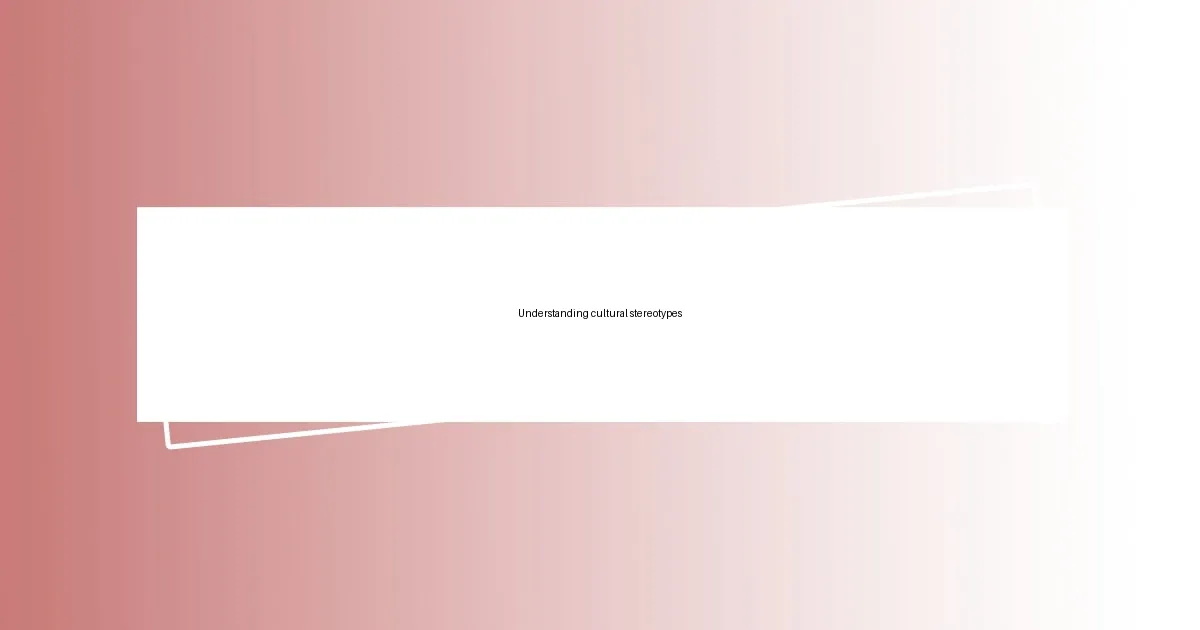
Understanding cultural stereotypes
Cultural stereotypes can often seem like quick mental shortcuts, but they can lead to misunderstandings that miss the rich tapestry of individual experiences. I remember a time when I met someone from a culture I thought I understood, only to realize my perceptions were entirely wrong. It made me question, how much do we really know about the people behind the labels we assign?
When I think about my travels, I’ve encountered various stereotypes that don’t hold true. For instance, I once visited a country known for its hospitality and found that not everyone embodied that trait. It struck me deeply—are we reducing vibrant cultures to simplistic narratives? This realization opened my eyes to the importance of engaging with people on a personal level, beyond their cultural backgrounds.
It’s fascinating to consider how stereotypes often stem from a mix of media portrayals and historical contexts. I find myself reflecting on how these preconceptions shape our interactions. Have you ever felt hesitant to approach someone because of an assumption based on their background? Recognizing these biases can be a pivotal step towards fostering meaningful connections and breaking down barriers.
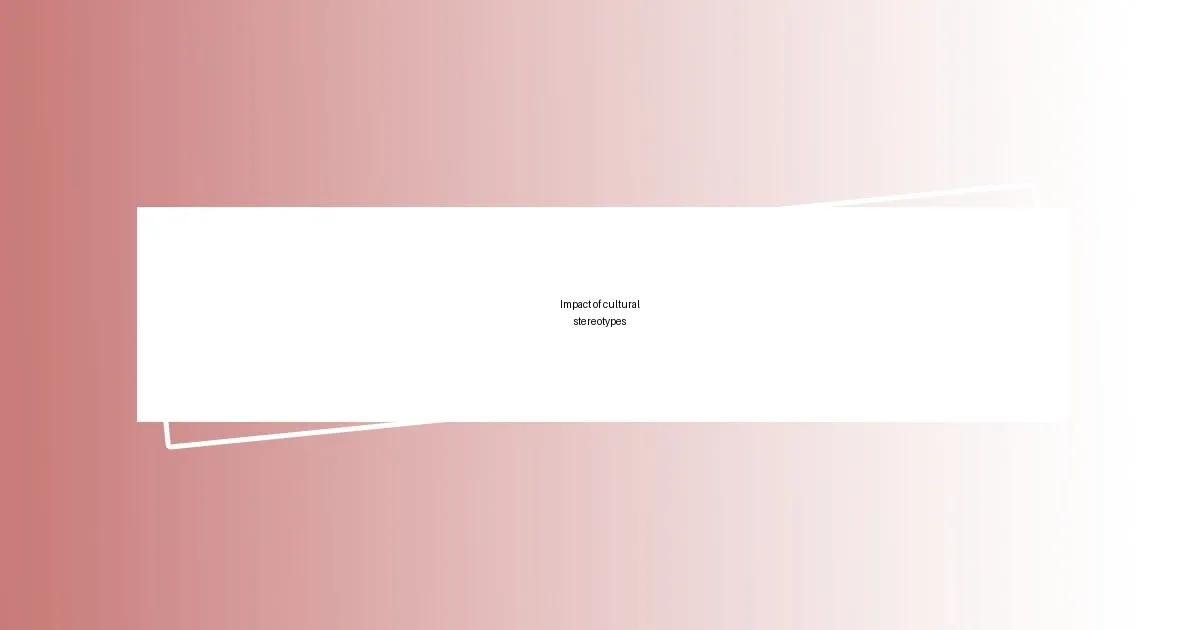
Impact of cultural stereotypes
Cultural stereotypes weigh heavily on individuals and communities, leading to both systemic and personal repercussions. I recall attending a multicultural festival where attendees educated each other about their customs. Yet, I also noticed a palpable tension; stereotypes fostered a divide that prevented deeper conversations. This experience reinforced my belief that reducing people to caricatures influences how we perceive their capabilities and potential.
The impact of cultural stereotypes can manifest in various ways, such as:
- Limiting opportunities, as individuals might be judged based on preconceived notions rather than their true abilities.
- Creating a lack of trust, making open dialogue and collaboration challenging in diverse settings.
- Fostering resentment among those unfairly labeled, pushing them to either conform to or resist societal expectations.
By reflecting on these examples from my life, I understand that cultural stereotypes not only oversimplify identities but also stifle genuine connections.
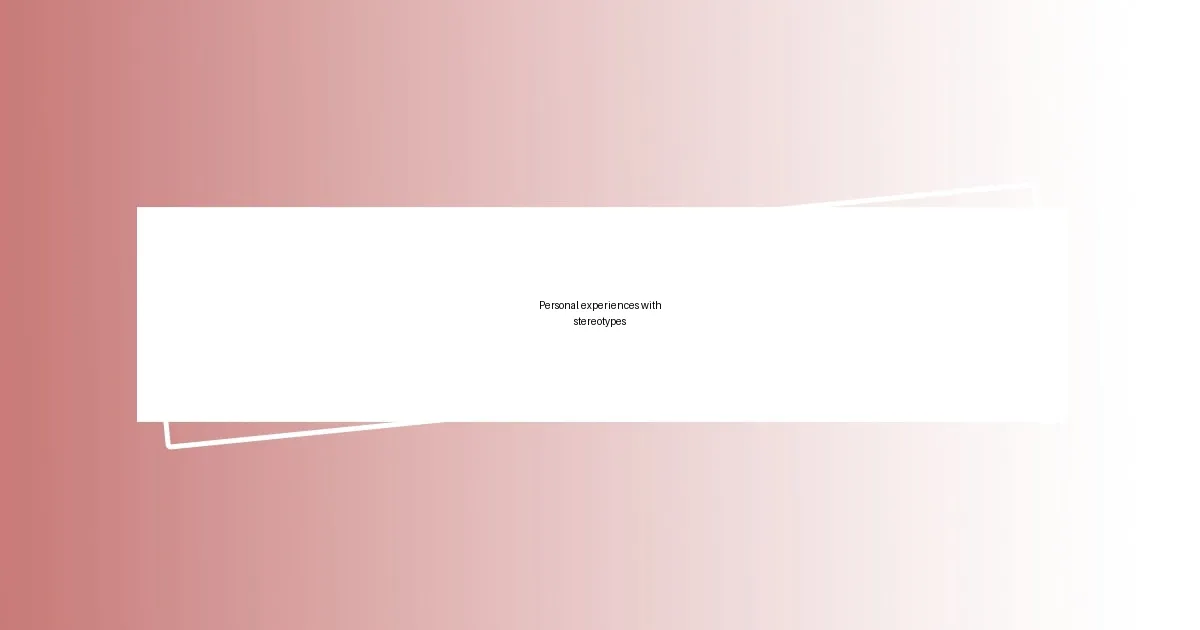
Personal experiences with stereotypes
When I was in high school, I vividly remember a classmate who often felt invisible due to the stereotype that boys in our school were less interested in academics than girls. It wasn’t until a group project brought us together that I discovered his passion for science and mathematics. This experience made me realize how quickly we can overlook someone’s talents based on preconceived notions.
During a community event, I had the chance to engage with individuals from various backgrounds. One person, in particular, told me how he was often seen as dangerous because of his appearance—a harsh stereotype tied to his ethnic background. His story struck me, and I could feel the weight of those assumptions on his shoulders. It reminded me how critical it is to challenge these surface-level judgments and embrace the complexity of each individual.
I often feel a mix of frustration and empathy when stereotypes surface in conversations. I was once told by a friend that my upbringing made me “less adventurous” than others, a comment that quite honestly stung. I realized that my experiences were valid, yet skewed by her limited view. It’s moments like these that push me to advocate for a richer, more nuanced understanding of each other’s stories.
| Stereotype | Personal Insight |
|---|---|
| Academic Capability | Discovered a classmate’s hidden talent through collaboration. |
| Dangerous Appearance | Engaged with someone who shared the weight of assumptions tied to ethnicity. |
| Adventurousness | Felt frustrated by a friend’s narrow view of my background. |
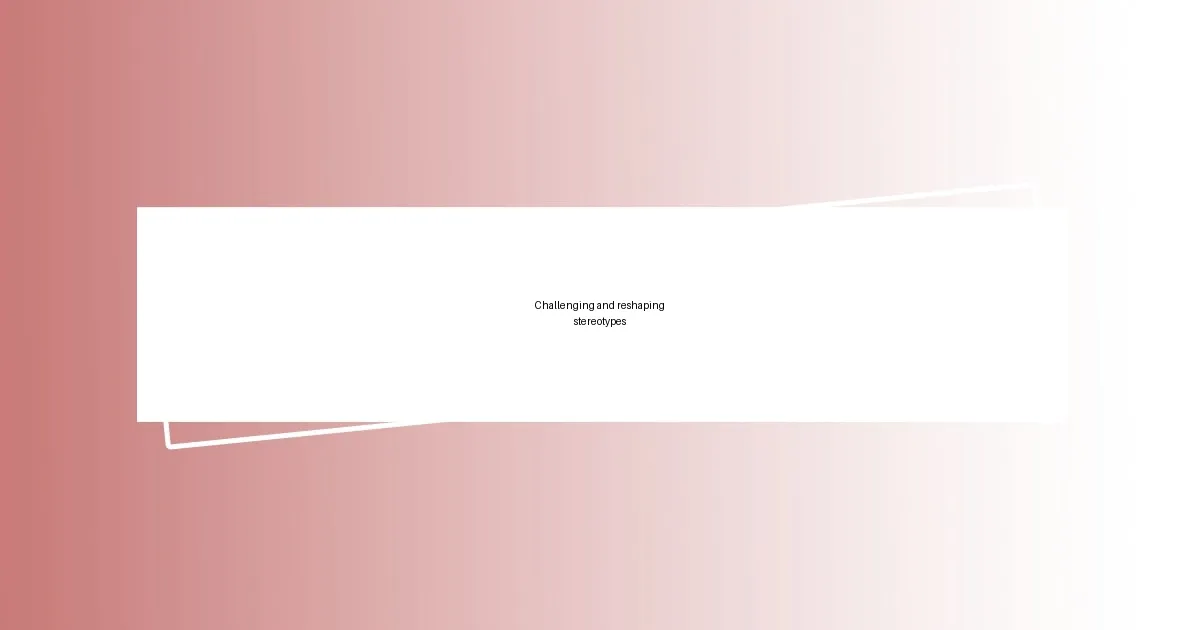
Challenging and reshaping stereotypes
Challenging cultural stereotypes often starts with personal conversations. I recall a road trip with friends where we dove into discussions about our backgrounds. Hearing their stories made me question the stereotypes I had unconsciously accepted. In those moments, I realized that reshaping these perceptions demands vulnerability—to share and be open about our own narratives. Isn’t it fascinating how much we can learn from one another when we let our guards down?
Engaging with someone at a workshop, I listened to a woman share her experience of being labeled as “too emotional” in her workplace. Her frustration was palpable, revealing how that stereotype overshadowed her clarity and assertiveness in decision-making. I found myself reflecting on this. How often do we dismiss someone’s expertise due to narrow views? It was a wake-up call for me to consider how often I might filter interactions through the lens of stereotypes, blocking authentic connections.
Just the other day, I stumbled upon a social media post highlighting a musician who defies the stereotype of his genre. I felt inspired and a bit sheepish. I had been guilty of pigeonholing genres based on artists’ backgrounds rather than their creativity. This moment nudged me to rethink how stereotypes can confine not only individuals but entire art forms. What if we had the courage to challenge these notions? I believe opening ourselves to diverse narratives enriches our understanding and fosters a more inclusive culture.
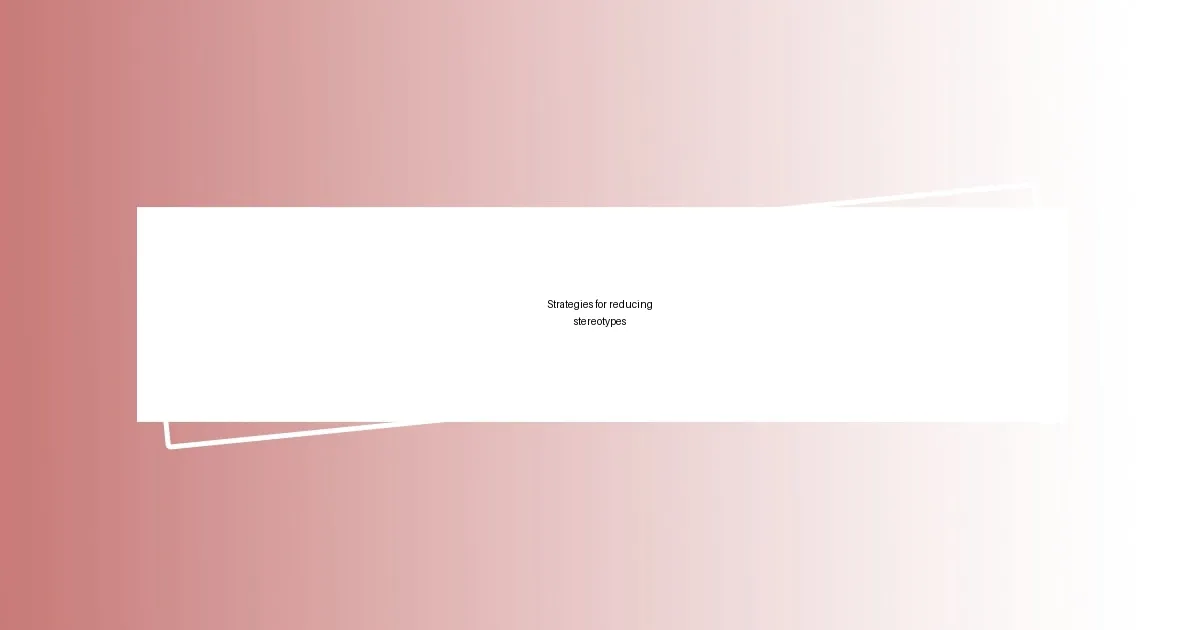
Strategies for reducing stereotypes
One effective strategy for reducing stereotypes is actively seeking diverse friendships. I remember a time when I reached out to a colleague from a different cultural background for coffee. Our conversation opened my eyes to unique perspectives that I had never considered before. Isn’t it funny how a simple cup of coffee can dissolve walls built by stereotypes? By sharing our experiences, we not only learn about each other but also challenge the assumptions that silently persist in our minds.
Another powerful tool is storytelling—sharing personal narratives can combat stereotypes in profound ways. I participated in a community storytelling event where individuals shared their life experiences. Listening to a woman describe her journey as a refugee shook my preconceived notions about what it means to be resilient. It made me wonder, how many stories do we miss out on by sticking to our judgments? Hearing these firsthand accounts is a compelling reminder that every individual has layers that deserve recognition beyond stereotypes.
Finally, educating ourselves through workshops and training can significantly aid in addressing stereotypes. I attended one focused on cultural competency, and it felt like a light bulb went off in my head. The interactive exercises made me confront my biases directly, sparking introspection that I hadn’t anticipated. How can we grow if we’re not willing to confront uncomfortable truths about ourselves? It’s crucial to participate in these experiences, as they foster an environment where stereotypes can be challenged openly and collectively.
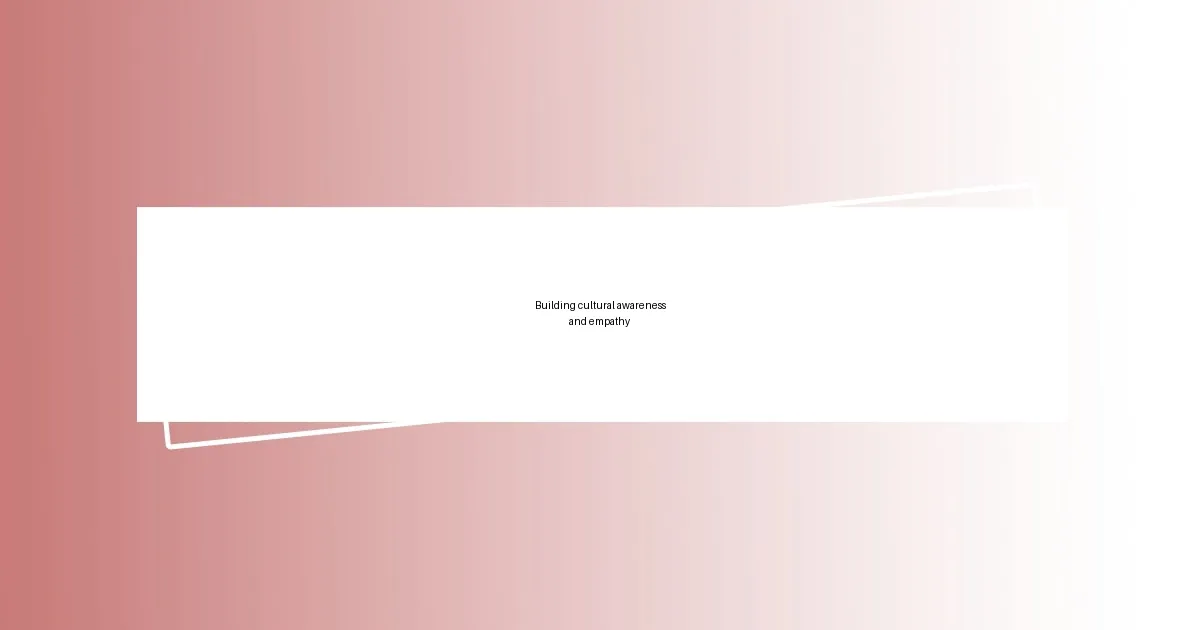
Building cultural awareness and empathy
I remember a day in my undergraduate studies, where I walked into a classroom filled with diverse faces from all walks of life. We were assigned to work in small groups, and despite initial hesitations, we started sharing our cultural traditions. It was eye-opening to see how each story unveiled layers of complexity beyond stereotypes. I quickly realized that every person carries a world of experience within them—how can we truly understand each other without taking the time to listen?
During a recent community event, I had a chance encounter with an elderly gentleman from a culture I was unfamiliar with. As he recounted his life story filled with both struggles and triumphs, I felt a wave of empathy wash over me. His laughter mingled with tears as he spoke, reminding me that behind every stereotype lies a human experience that is often overlooked. What if we made it a habit to seek out these stories in our daily lives? Wouldn’t that help break down the barriers that still exist in our society?
Engaging in cultural exchange isn’t just about learning facts; it’s about connection. The last time I attended a cultural festival, I found myself drawn to a booth where artisans displayed crafts from their homeland. I listened intently as a young woman explained the significance of each piece, and I couldn’t help but feel a connection to her passion. Isn’t it remarkable how these moments can foster a deeper understanding of one another? Embracing this kind of cultural awareness fuels empathy and truly changes how we view the world around us.









